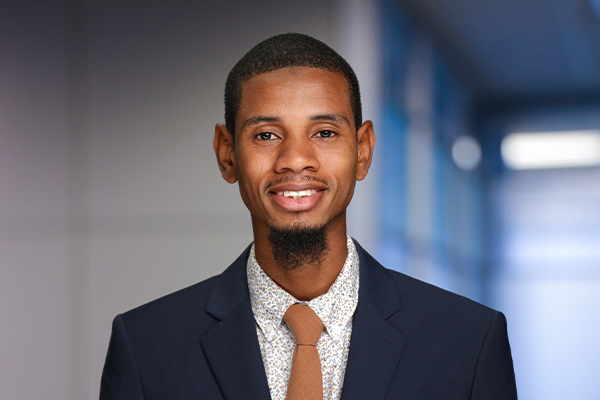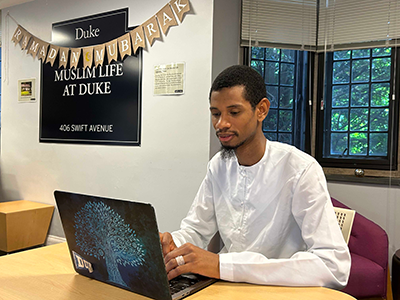Muhammed Bah, Master of Science in Population Health Sciences

Hometown
Youna, The Gambia
What inspired you to pursue this degree?
My undergraduate studies in global health, particularly the ethics of infectious disease control and the significance of public health guidelines, laid the foundation for my interest in population health sciences. The pivotal moment was when I watched the movie "Contagion" twice during my college years — first in my freshman Global Health FOCUS seminar, "Global Diseases," and again in my senior year in a class called "Literature and Films of Pandemics." These experiences deeply influenced my understanding of pandemic preparedness and response.
When COVID-19 emerged, I felt compelled to take action. I created audio and video messages in my native Fula(ni) language to raise awareness among those who might not fully understand the CDC and WHO guidelines. Later that year, I traveled to The Gambia and was struck by how different the situation felt — masking and distancing were largely absent, as though the pandemic had ended.
Conversations with fellow Gambians made it clear that while many people understand disease causes and what is required of them, implementing preventive measures such as working from home can be difficult. This is partly due to the difficult decisions that must be made when addressing communicable diseases. For instance, a large family relying on a single income may choose to work during a pandemic, especially in an informal economy. They would rather risk getting COVID-19 than see their loved ones go hungry and not be able to help. These are not selfish choices, but rather ones made out of necessity.

This realization solidified my interest in population health sciences. I want to explore how epidemiologists, implementation scientists, and global health professionals can co-create sustainable, community-driven interventions for low-resource settings like The Gambia — ones that enable families to stay healthy without sacrificing their livelihoods.
Why did you choose Duke?
I chose Duke because of its strong interdisciplinary approach to global and population health. The university centers equity, evidence-based policy, and community partnership in its work and training, which aligns perfectly with my values. I was particularly drawn to the Department of Population Health Sciences (DPHS) for its commitment to applied research that directly benefits communities, both locally and globally.
Duke is also home for me. I completed my undergraduate degree here and worked closely with the Center for Muslim Life (CML). The opportunity to return to a community that shaped me — both academically and spiritually — was a significant part of my decision.
Do you have a favorite memory from your program?
My favorite memory from the program was the discussion of the DPHS Common Book led by Duke librarian Dr. Lesley Skalla during our orientation. The department provided copies of the book “What the Eyes Don’t See: A Story of Crisis, Resistance, and Hope in an American City” by Mona Hanna-Attisha for all the students, both master’s and PhD candidates. This was a wonderful opportunity to learn about each other and to see how our diverse experiences shaped the main takeaways each of us had from the book. It set the tone for a collaborative and reflective learning environment that emphasized listening, empathy, and action.
How do you hope to make an impact with your career?
I hope to work with governmental and international health organizations to design community-informed, scalable interventions for low- and middle-income countries. My long-term goal is to join the World Health Organization and contribute to policies that reflect local realities while promoting health equity. I believe that science and technology must be paired with culturally sensitive, locally developed strategies to be truly effective in improving lives.
What was the most important thing you learned at Duke?
The most important lesson I learned is the value of trust and rapport in research. If researchers enter a community without respect or transparency, it can cause long-lasting mistrust — not just in their study, but in research as a whole. At Duke, I came to understand that researchers are not the only experts in the room. The participants are experts of their own lives, and we must work alongside them to create meaningful and ethical change.